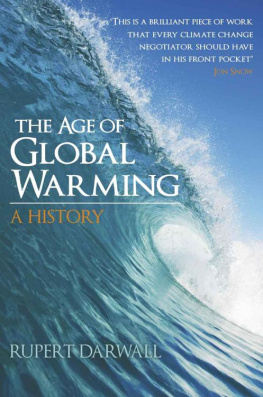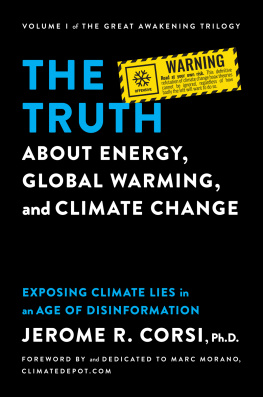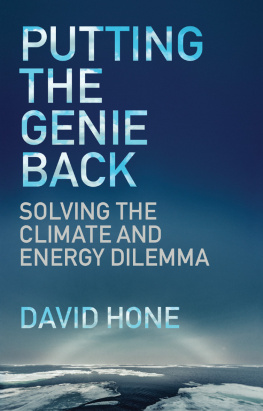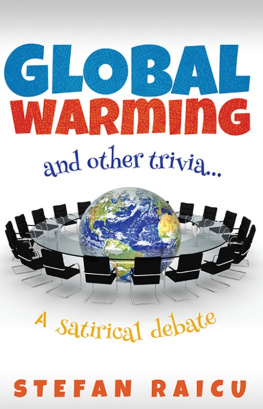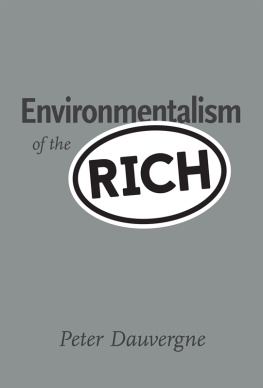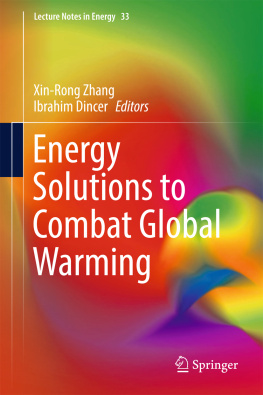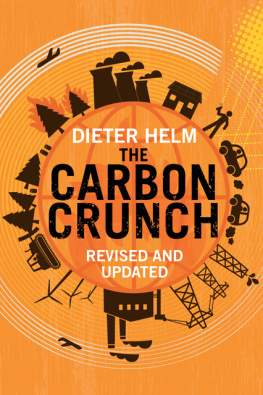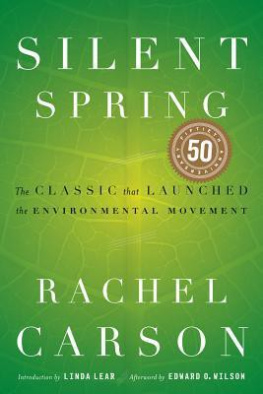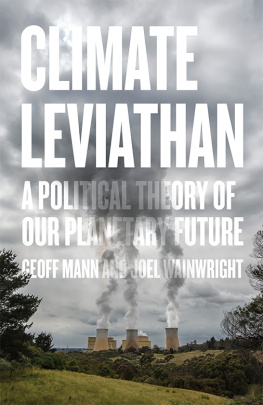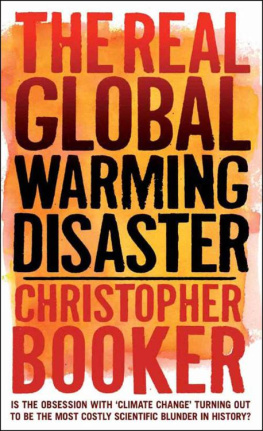All rights reserved.
1
The Idea
It is ideas that make history Human society is an issue of the mind.
Ludwig von Mises
The orthodoxy produced by intellectual fashions, specialisation, and the appeal to authorities is the death of knowledge, and that the growth of knowledge depends entirely upon disagreement.
Karl Popper
Polar bears or swallows?
The two symbolise the dilemma posed by global warming.
A male polar bears desperate struggle for food was captured in the 2006 BBC television series Planet Earth . Eventually the exhausted animal finds a pod of walruses. Three times he attacks. Each time he fails, retreating to lie down and die. The burgeoning number of polar bears has replaced the giant panda as the icon of a species on the verge of extinction and of fragile nature endangered by man.
Swallows crossing the Sahara can lose up to half their bodyweight as they fly from Northern Europe to Southern Africa burning hydrocarbons, one of the highest density sources of energy found in nature. For the same reason, mankind has come to depend on hydrocarbons.
Global warmings entrance into politics can be dated with precision 1988; the year of the Toronto conference on climate change, Margaret Thatchers address to the Royal Society, NASA scientist James Hansens appearance at a congressional committee and the establishment of the Intergovernmental Panel on Climate Change (IPCC).
By then, the world was ready.
Rounds of international climate change conferences and treaties followed the Rio Earth summit and the United Nations Framework Convention on Climate Change in 1992, the 1997 Kyoto Protocol culminating in the 2009 Copenhagen climate conference, interspersed with periodic pronouncements from the IPCC with four assessment reports (1990, 1995, 2001 and 2007) sounding a crescendo of alarm.
The global warming idea is composed of three propositions which proceed from two facts. The first fact is that carbon dioxide is one of a number of so-called greenhouse gases (the most abundant being water vapour). The second is that the proportion of carbon dioxide in the atmosphere has risen by around thirty-five per cent from pre-industrial times.
The first proposition is about the past. Increased carbon dioxide, together with other greenhouse gases emitted by human activities, has caused global temperatures to rise.
The second is about the future. Left unchecked, rising global temperatures will cause immense damage to the environment and humanity.
The third proposition is political. Developed countries should lead the world in making deep cuts in carbon dioxide emissions, preferably by substituting fossil fuels with renewable energy sources such as wind and solar power.
Why was the world ready for this new idea?
Global warming did not make itself evident like a solar eclipse. People had to be told it was happening. An event of such historical magnitude does not come out of nothing. It can be understood in terms of ideas, which in turn reflect particular values and visions.
The British mathematician and philosopher A.N. Whitehead said that the spiritual precedes the material; philosophy works slowly before mankind suddenly finds it embodied in the world. It builds cathedrals before the workmen have moved a stone.
So it is with global warming.
During the course of the twentieth century, mankinds relationship with nature underwent a revolution. At the beginning of the last century, human intervention in nature was regarded as beneficent and a sign of the progress of civilisation. By its end, such interventions were presumed harmful unless it could be demonstrated they were not.
The entry of nature into politics was of very different character on either side of the Atlantic. In the US, it was healthy. Unlike the European versions, it was not defined by opposition to democracy or capitalism.
In Germany and Britain, to the degree that the British variant was influenced by German thinking, it emerged from the same swamp in which Nazi doctrines festered. Accordingly, only the American variant was viable after the Second World War.
The pivotal year was 1962 with the publication of Rachel Carsons Silent Spring . Within a decade, the notion that mankinds pillaging of the planet was leading to an environmental catastrophe risking mans extinction had taken hold.
If all man can offer to the decades ahead is the same combination of scientific drive, economic cupidity and national arrogance, then we cannot rate very highly the chances of reaching the year 2000 with our planet still functioning and our humanity securely preserved
words written by Barbara Ward, the other seminal environmentalist of the era, in Only One Earth . It had been commissioned for the first major UN conference on the environment at Stockholm in 1972.
Malthusian ideas had enjoyed previous bouts of popularity. The first was at the end of the eighteenth century, when Thomas Malthus predicted disaster as population growth would outstrip food production. In 1865, the foremost economist of the day, William Stanley Jevons, shifted the focus from food to resource depletion. Britains economic demise was inevitable with the exhaustion of cheap coal. Similar scares afflicted the US before and after the First World War.
What was new in the late 1960s and early 1970s was the pervasiveness of doomsday predictions. 1972 also saw publication of the Club of Romes The Limits to Growth and A Blueprint for Survival , signed by leading British scientists of the day, predicting the end of civilisation.
At Stockholm, the Wests environmental awakening had to contend with another force of the post-war era the ambition of newly independent Third World nations to industrialise. A Third World boycott was averted by Maurice Strong, the UN conference organiser, and Ward formulating a political compact between First World environmentalism and Third World development aspirations. Under it, economic growth was deemed double-edged. When rich countries got richer, it harmed the environment; when poor countries grew, the environment benefited.
Sustainable development the link forged by Strong and Ward between environmentalism and the Third World development agenda was pushed onto the international agenda by the 1980 Brandt Report and the 1987 Brundtland Report. Whatever its accuracy as a description of reality, sustainable development was the political fiction environmentalism needed to buy developing nations neutrality, a fiction that broke down when the increase in developing countries greenhouse gas emissions overtook those of the developed world.
Then, as Sherlock Holmes explained to the Scotland Yard detective, there is the curious incident of the dog in the night-time. But the dog did nothing. That, Holmes replied, was the curious incident.
Marx and Engels condemned Malthus and his population theory. In turn, their labour theory of value put no value on pristine nature. The timing of the demise of Marxism as a living ideology meant that global warming never had to contend with opposition from the Left of the political spectrum. It is hard to conceive of the pre-Gorbachev Soviet Union being a party to global environmental treaties on ideological grounds, let alone during a strategic race to bury the West.

